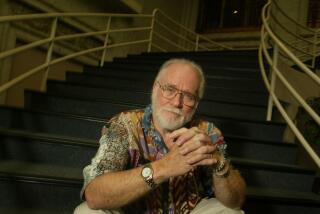Richard Heffner dies at 88; longtime head of movie ratings system
When Jack Valenti, the president of the Motion Picture Assn. of America, asked historian and public television host Richard Heffner to oversee the group’s controversial movie ratings system, Heffner turned it down, saying his mother “did not raise me to count nipples.”
But Heffner eventually reconsidered and became, by some accounts, “the least-known most powerful person in Hollywood.”
Heffner, who for two decades helped parents decide which movies were suitable for children, died Tuesday at his New York City home of a cerebral hemorrhage, said his son, Daniel Heffner. He was 88.
As chairman of the MPAA’s Classification and Rating Administration from 1974 to 1994, Heffner presided over the awarding of P, PG, R and X ratings and helped develop the PG-13 and NC-17 categories.
During his tenure, the review board often riled Hollywood players with ratings they saw as unfairly restrictive. At the same time, he and the board angered citizens’ groups who perceived them as too soft on violence and sex.
“He both loved it and hated it at the same time,” his son said of the job.
When he was approached by Valenti nearly 40 years ago, Heffner was known to public television audiences as the moderator of “The Open Mind,” the public affairs show he launched in 1956. Over the next five decades he hosted conversations with leading politicians, activists, intellectuals and celebrities, including Margaret Mead, Isaac Asimov, Betty Friedan, Norman Mailer, Malcolm X and Jimmy Carter.
He saw the program as an extension of his work as an educator, most notably at Rutgers University, where he taught for nearly 50 years.
Richard Douglas Heffner was born in New York on Aug. 5, 1925. He earned his bachelor’s and master’s degrees in American history from Columbia University, and taught at Sarah Lawrence College and the New School for Social Research. In 1964 he became a professor of communications and public policy at Rutgers.
He wrote “A Documentary History of the United States” (1952), a bestseller that inspired him to broaden his audience. He decided to break into television with a program pegged to the eighth anniversary of Franklin Delano Roosevelt’s death in 1953.
“I went to every television station in New York holding my book, saying: ‘I’m a professor of American history. I’d like to do a program about FDR’s death,’” he recalled in the New York Times in 2003. “And they all said: ‘Who the hell are you? Go away.’”
He finally convinced a radio station to broadcast his interview with Eleanor Roosevelt.
He worked as a freelance writer, producer and broadcaster until 1956, when he started moderating “The Open Mind” on an NBC television station in New York. He later moved the show to the local public television station WNET, which he helped establish in 1961 as its first general manager.
With a simple set that featured Heffner and his guests seated around a table, the show’s emphasis was on ideas. “One could listen and learn, and if not be persuaded, at least be informed,” reviewer John Corry wrote in the New York Times in 1987. Many of Heffner’s conversations were collected in the book “A Conversational History of Modern America” and are available in a WNET digital archive.
To mark the 50th anniversary of the show in 2006, Heffner switched seats and let television journalist Bill Moyers interview him. He reminisced about his favorite guests, including Malcolm X, who came on the show after the assassination of civil rights leader Medgar Evers, and former CIA director Richard Helms, who talked about meeting Adolf Hitler.
When Heffner accepted Valenti’s offer in 1974, he commuted every week to Los Angeles, where he watched movies and advised the members of the ratings panel, who were parents with no involvement in the film business.
During Heffner’s tenure, the MPAA was the target of a rare lawsuit over its classification system: It was sued by Miramax for the X rating given to Pedro Almodovar‘s 1990 black comedy about a mental patient who kidnaps a porn star, “Tie Me Up! Tie Me Down!”
The case brought criticism of Heffner’s style as chairman. Although he said he generally voted only to break a tie, prominent directors and producers who had clashed with him over their films said he wielded great influence. “He’s completely on your side, it seems, like he wants to help the movie … then the guy kills you,” director Alan Parker, who butted heads with Heffner over the first cut of his 1987 voodoo thriller “Angel Heart,” told the Los Angeles Times in 1990. Others, such as director William Friedkin, described Heffner as dictatorial.
That criticism was probably unfair, according to Stephen Farber, president of the Los Angeles Film Critics Assn. and author of “The Movie Rating Game” (1972).
“My impression was he was less dictatorial than others who headed the rating board,” Farber, who has written about movies and the film industry for more than 40 years, said Friday. “He seemed to me a very reasonable person who was pained by some of the decisions he enforced.”
In his last years as chairman, Heffner argued with Valenti over studio heads interfering in ratings decisions. Heffner told an oral history project at Columbia University that Valenti negotiated his departure in 1994.
“I was a surrogate for parents,” Heffner told the New York Times when he stepped down as chairman. “I had children. I had grandchildren. I knew parents were concerned — more, I think, with violence in films than sex, but sex too was often shown as violence. When I saw something that would have been bad for my grandchildren, I knew it was bad for us as a society. I did not need the industry to tell me it was good.”
Besides his son Daniel, Heffner is survived by his wife, Elaine, son Andrew, and four grandchildren.
More to Read
Start your day right
Sign up for Essential California for the L.A. Times biggest news, features and recommendations in your inbox six days a week.
You may occasionally receive promotional content from the Los Angeles Times.







